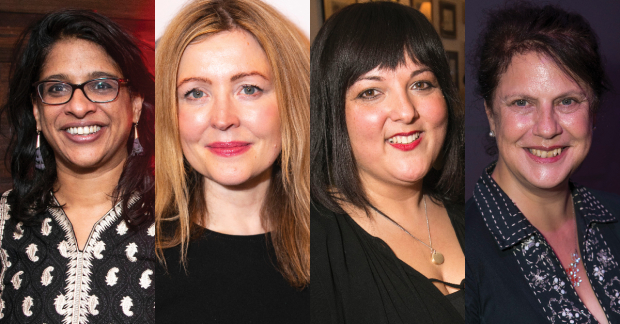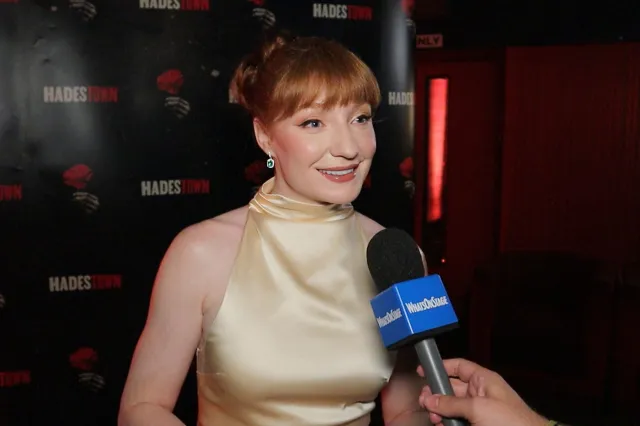International Women's Day: female artistic directors offer their advice to women in theatre
We spoke with eight artistic directors to find out their top tips for following in their footsteps

© Dan Wooller for WhatsOnStage
Rachel O'Riordan, Lyric Hammersmith
The road to becoming an artistic director is different for everyone; we don't all start from the same place. I never assisted established directors, for example, which is a route many take and which can work well for them. Instead, I set up a new writing company and made work in Belfast.
I would say that making your own work, being in charge of your creative choices when you are starting out, is really worthwhile. Learn who you are as an artist. It's harder, but not waiting on others to give you opportunities is empowering. Having a strong sense of your artistic vision and being resilient and resourceful are vital qualities for artistic leadership of any sort. I would also say – observe people you admire. Be aware of what you can learn from their success.
Tamara Harvey, Theatr Clwyd
Learn every job in the theatre that you can – you need to know what you're asking from your teams and the best way to know is to have done it. Be kind. Be courteous. Be strong. Know that the fact that you're a woman is – should be – irrelevant. Anyone who makes you feel otherwise is an idiot.
Watch plays, read plays, go to galleries, learn poems, listen to music, talk to people about their lives, their jobs, their passions – understand people and you might start to understand what your theatre can be to them. And know that it's not a race. You'll be a better artistic director at forty than you would have been at twenty-two (though you may have more energy and fewer small people at twenty-two).
Nadia Fall, Theatre Royal Stratford East
When I started my journey, I had a lot of shame and embarrassment about my dreams and calling myself an artist in the first place. It took time to learn to park that. Too long. I'd probably tell my younger self and younger women to get over that sharpish, there are enough forces trying to hold us back, and how dare they. Take up space my brilliant women!
Know that self-doubt is part of it, and resistance from others or obstructive forces might well continue, but find yourself the stories that you absolutely need to tell, and hold on tight. Pushing those precious stories forward will in turn pull you up.
Being a director can be lonely and isolating. Reach out and connect with other women artists: spend time talking through ideas, debating, provoking, being angry, laughing, inspiring each other. Giving each other energy and support regularly won't be draining, it will reboot you. And it's the only way to effect individual and greater societal change. Let's just say I could not do it without my buddies.
Remember it takes stamina to be an artist. It's not about cracking one instance (though I wish us all plenty of those joyful eureka moments); this is a life-long commitment. Take away that pressure of time, this is a long game that gets better through practice and life experience.
Oh, and don't bother following in anyone else's footsteps, there is no one route on this journey!
Indhu Rubasingham, Kiln Theatre
Find mentors. Talk to people, people want to give advice and support. I wish I'd found a mentor earlier, they open doors, help make connections and they make it seem much more manageable than you realise. The job of an artistic director can be quite a lonely job, so it's useful to have a support network and know that you are not alone in it.
Believe that you can do it – anything is possible. Don't doubt yourself or your abilities because that will be your biggest block. It's absolutely all possible. This is what I've had to work hard at, it's not a straight journey, but that's OK. There's as many different ways to become an artistic director as there are artistic directors, there's not one route. Someone once told me that a career in theatre is like being a tree, there's fast-growing trees and slow growing trees, don't compare yourself to others, but know that you are on your own journey.
Ellen McDougall, Gate Theatre
One of my favourite things about being an artistic director is the opportunity I get to listen to the ideas and thoughts of other artists, and to support them to develop work. It makes it possible to be help shape work that I could never make myself, and it inspires and tests me as an artist too.
I think one of the hardest things about it, that I'm constantly learning, is how to make enough time for both these conversations, and the conversations with my mentors who advise and inspire me, amongst all the other things. But so often I walk away from these meetings with a fresh sense of purpose and renewed enthusiasm and clarity around ideas I might have been chewing over for a while.
So I think my advice for becoming an artistic director is to take time to find inspiration in the other artists around you both those with more and less experience than you have, and especially those who are different to you – in the work they make, and their perspective on the world."
Roxana Silbert, Birmingham Rep
The joy and tension of being an artistic director is leading an organisation at the same time as being an artist. They are two different bits of your brain. I found learning to enjoy that tension has been the key to feeling fulfilled whilst honouring the needs of the company and your shows. I didn't want to run a theatre until I had satiated my desire to be in a rehearsal full time and I'd certainly say to anyone, don't feel you have to rush into it. Once you're an artistic director you will never be in a rehearsal room without distractions: meetings, programming, firefighting the daily ups and downs that come with running any company. You also need to be as interested in the work of others as your own. Having said that, I wish I'd felt less guilty and more vigilant in protecting my own creative practise. Your theatre wants you to produce good shows, so it's not selfish. It's good for them and you.
Many young women in the industry suffer from imposter syndrome and try to find the "right" way to do things, especially in a leadership role. I've learnt there is no right or textbook way – stay honest to your values and own ideals that's the right way. I would say get to know yourself, your strengths and weaknesses, then surround yourself with people who are really good at the things you're not and let them shine. Most importantly, once you're in a position of power use it to facilitate change: in the stories you programme and the opportunities you offer others.




















